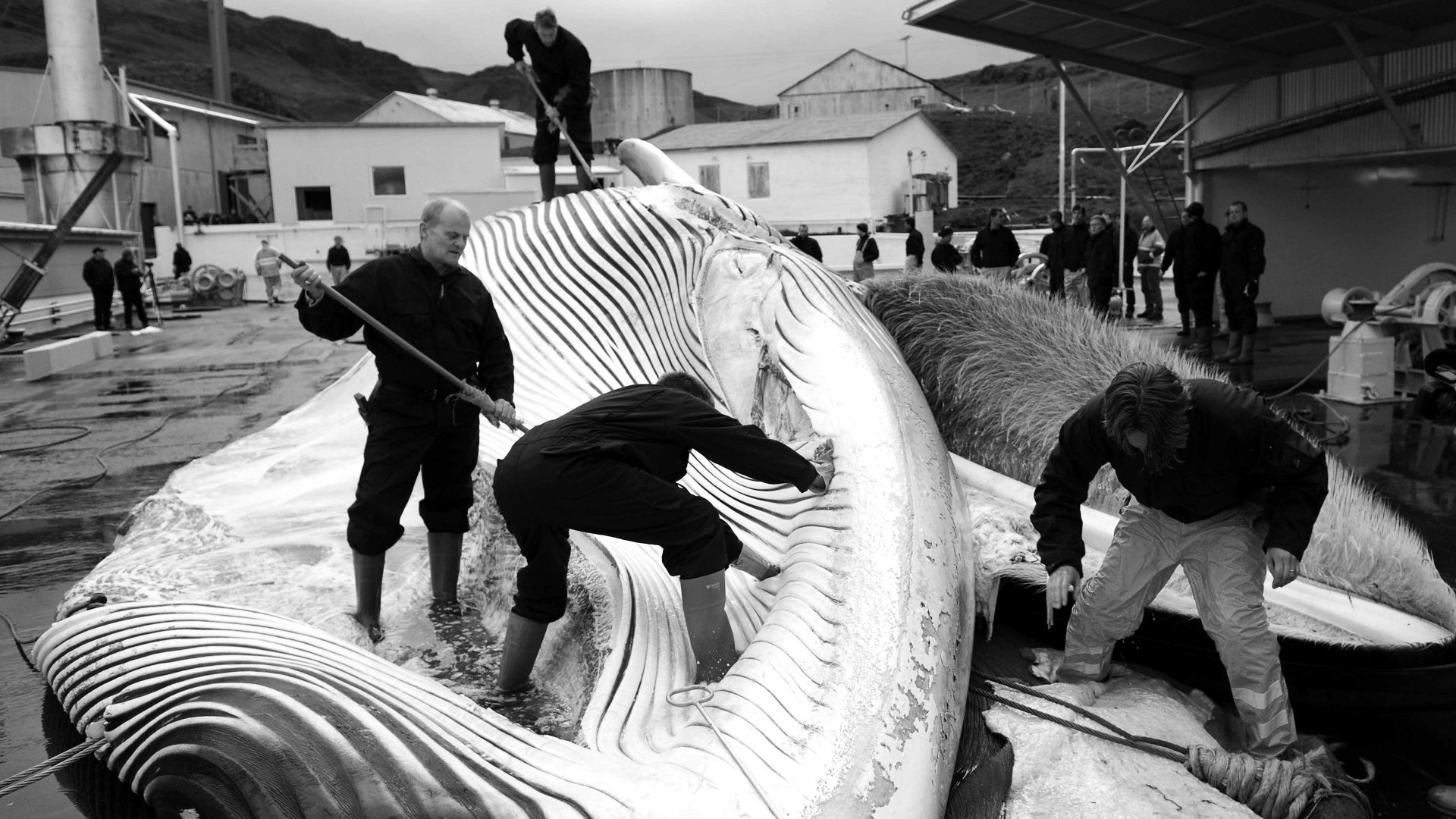Bad news for fin whales. Iceland has lifted its summer suspension of whaling. Hvalur, the only remaining commercial whaling company there, can resume its work, albeit under tight restrictions. Whaling must take place in daylight, and the whales must be no further than 25 metres away from the ship, and not with calf. The whaling season ends at the beginning of October, so fin whales only need elude the exploding harpoons for three or four weeks, but there’s every chance that the renewal of this permit will result in many deaths – the annual quota allows 209 fin whales and 217 minke whales to be slaughtered.
Fin whales can grow to over 20 metres long and weigh more than 70 tons. Only the blue whale is longer. Left to their own devices, fin whales can live remarkably long lives – 90 years or more. But they have been hunted to the point of becoming a threatened species. They are sometimes victims of collisions with ships or discarded fishing gear, become disoriented by sonar, and are occasionally attacked by killer whales. Global warming affects them, too. But the principal threat to their existence is hunting, and the main incentive for hunting them is to sell their meat to the Japanese. Apart from Iceland, Norway and Japan are the only countries still permitting commercial whaling, albeit in the face of strong opposition from conservationists.
Whales are highly intelligent, communicate across great distances, and have intrinsic appeal, but is it hypocrisy for countries where meat-eating is widely practised to lecture Iceland about its fishing policies, or Japan about culturally different eating habits? Pigs, after all, are highly intelligent, and yet most British supermarkets stock pork sausages. Is hunting whales for their meat any worse than killing pigs for theirs?
The main reason why Iceland had stopped whale hunting was the recognition that conventional means of killing caused intense suffering. High-powered explosive harpoons are designed to kill whales outright, but some wounded animals survived for hours in agony before dying. There is a widespread presumption that wherever possible we should minimise the suffering of sentient beings. That is what the humane treatment of animals demands. Towards the end of the 18th century, Jeremy Bentham wrote that the key question about animals and how we treat them is not whether they can reason or talk, but whether they can suffer. Today that is a widely held view.
But what if whaling could be carried out in a completely painless way? Would that make it ethically acceptable? Hardly. Wild rabbits are common, and shooting one and killing it almost instantly causes it minimal suffering and for a very short time. Some animal activists will argue that this is still wrong, that the rabbit has an interest in continuing to exist that you should respect. Gary Francione takes this line in his recent book, Why Veganism Matters. He argues that any use of animals is wrong, and in particular that we should stop eating meat whether or not animals suffer in its production. But those who, like Peter Singer, base their veganism or vegetarianism on minimising suffering will have a much stronger case against eating a pig that has been reared intensively in cramped and crowded conditions than eating a hunted rabbit that has been shot dead in the wild. Isn’t a humanely killed whale somewhat in the position of a quickly killed wild rabbit?
No. Fin whales are an endangered species and this makes killing them, even killing them humanely, much more of an issue. Their stock is not replaceable, they take many years to reach maturity, and there will be significant environmental consequences of further reducing whale numbers. There would be outrage if people started eating great crested newts or orangutans or other rare animals, even from those who regularly eat hunted rabbit or pork sausages. Likewise, there should be outrage that Iceland is licensing whale hunters. Whales have a particularly significant role in the marine ecosystem. Their fecal plumes (and they produce a lot of excrement) feed the surface phytoplankton, which are an important part of other animals’ food chains and a source of atmospheric oxygen. Whales’ bodies also capture large amounts of carbon.
Yes, Icelandic regulations are designed to minimise whale suffering, yes, whale hunting in Icelandic waters is on the way out. But there’s more at stake. Banning all whale hunting now is the best chance of fin whales’ survival as a species, and is good for the planet. Anything short of a complete ban is immoral.



